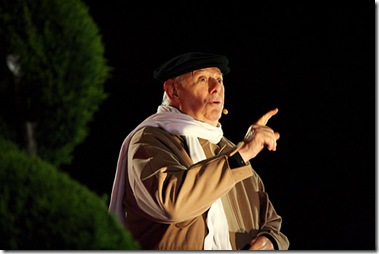World Theatre Day, March 27. Events in Ottawa and the Official Message from Dario Fo in English and in French.
Dario Fo, the actor, writer and director who inherited and transmitted the Commedia dell’arte tradition,won the Nobel prize in 1997,
Today, his official message for World Theatre Day (2013), published by the International Theatre Institute, follows in English and French, translated from Italian
English
A long time ago, the people in power resolved the intolerance against Commedia dell’Arte actors by chasing them out of the country.
Portrait of Dario Fo. Photo taken at the Venice Carnival in Italy, February 2009.
Copyright © Marina Muolo
Today, actors and theatre companies have difficulties finding public stages, theatres and spectators, all because of the crisis.Rulers are, therefore, no longer concerned with problems of control over those who express themselves with irony and sarcasm, since there is no place for actors, nor is there a public to address.
On the contrary, during the Renaissance, in Italy those in power had to make a significant effort in order to hold the Commedianti at bay, since these enjoyed a large audience.
It is known that the great exodus of Commedia dell’Arte players happened in the century of the counter-Reformation, which decreed the dismantling of all theatre spaces, especially in Rome, where they were accused of offending the holy city. In 1697, Pope Innocent XII, under the pressure of insistent requests from the more conservative side of the bourgeoisie and of the major exponents of the clergy, ordered the demolition of Tordinona Theatre which, according to the moralists, had staged the greatest number of obscene displays.
At the time of the counter-Reformation, cardinal Carlo Borromeo, who was active in the North of Italy, had committed himself to the redemption of the “children of Milan”, establishing a clear distinction between art, as the highest form of spiritual education, and theatre, the manifestation of profanity and of vanity. In a letter addressed to his collaborators, which I quote off the cuff, he expresses himself more or less as follows: “Concerned with eradicating the evil weed, we have done our utmost to burn texts containing infamous speeches, to eradicate them from the memory of men, and at the same time to prosecute also those who divulged such texts in print. Evidently, however, while we were asleep, the devil labored with renewed cunning. How far more penetrating to the soul is what the eyes can see, than what can be read off such books! How far more devastating to the minds of adolescents and young girls is the spoken word and the appropriate gesture, than a dead word printed in books. It is therefore urgent to rid our cities of theatre makers, as we do with unwanted souls”.
Thus the only solution to the crisis lies in the hope that a great expulsion is organized against us and especially against young people who wish to learn the art of theatre: a new diaspora of Commedianti, of theatre makers, who would, from such an imposition, doubtlessly draw unimaginable benefits for the sake of a new representation.
Translation by Victor Jacono, ITI Italy and Fabiana Piccioli
En Français
Message International de la Journée Mondiale du Théâtre 2013
Message de Dario Fo Prix Nobel, 1997.
Le pouvoir a naguère voué les comédiens à l’intolérance et les a chassés hors de leur pays.
Les acteurs et les troupes peinent aujourd’hui à trouver places, théâtres et public; tout cela à cause de la crise.
Les gouvernants n’ont donc plus à se préoccuper de contrôler ceux qui s’expriment avec ironie et sarcasme, car les acteurs n’ont plus ni espaces, ni parterres à qui s’adresser.
Au contraire, pendant la Renaissance en Italie, les dirigeants avaient beaucoup de mal à maîtriser les comédiens, qui jouissaient d’un public très large.
On sait que le grand exode des comédiens advint au siècle de la Contre-Réforme, qui décréta le démantèlement de tous les espaces théâtraux, en particulier à Rome, où on les accusait d’outrage à la ville sainte. Le Pape Innocent XII, sous la pression de la frange la plus conservatrice de la bourgeoisie et des hauts représentants du clergé, avait ordonné, en 1697, la fermeture du théâtre de Tordinona, sur la scène duquel avaient eu lieu, selon les moralistes, le plus grand nombre de spectacles obscènes.
Du temps de la Contre-Réforme, le cardinal Charles Borromée, en fonction dans le nord de l’Italie, se consacra de façon prolifique à la rédemption des « enfants milanais », établissant une distinction nette entre l’art, forme la plus haute d’éducation spirituelle, et le théâtre, expression du profane et de la vanité. Dans une lettre adressée à ses collaborateurs, que je cite de mémoire, il s’exprime plus ou moins en ces termes : « Nous qui sommes résolus à extirper la plante maligne, nous avons tâché, en jetant au feu les textes aux discours infâmes, de les extirper de la mémoire des hommes, et de poursuivre aussi ceux qui ont divulgué ces textes en les imprimant. Mais, évidemment, pendant que nous dormions, le démon œuvrait avec une nouvelle ruse. Combien l’âme est plus imprégnée par ce que les yeux voient, que par ce que l’on peut lire dans les livres de ce genre! Combien le mot, dit avec la voix et le geste approprié, blesse plus gravement les esprits des adolescents et des jeunes filles, que la parole morte imprimée sur les livres. Il est donc urgent de chasser de nos villes les gens de théâtre comme on le fait déjà pour les esprits indésirables”.
Ainsi, la seule solution à la crise réside dans l’espoir d’une grande chasse aux sorcières contre nous, et surtout contre les jeunes qui veulent apprendre l’art du théâtre: ainsi naîtra une nouvelle diaspora de comédiens, qui tirera sans doute de cette contrainte des bénéfices inimaginables pour une nouvelle représentation.
Traduction: Etienne Chantoin, Alice Gardel et Florian Maganza

